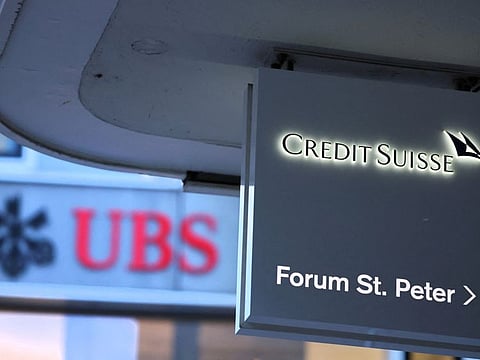UBS smashes banking record as it absorbs Credit Suisse
UBS now commands roughly $5 trillion in client assets

Zurich: UBS Group posted the biggest-ever quarterly profit for a bank in the second quarter as a result of its emergency takeover of Credit Suisse, and confirmed that it would fully integrate the local business of its former rival by next year.
The $29 billion gain is a result of the accounting difference between the $3.8 billion price UBS paid for Credit Suisse and the value of the acquired lender’s balance sheet. Underlying profit for the first combined UBS-Credit Suisse quarter came in at $1.1 billion.
UBS now commands roughly $5 trillion in client assets, cementing its status as a global wealth-management powerhouse.
UBS’s shares jumped as much as 7.2 per cent after the open in Zurich on Thursday, having gained almost 40 per cent this year.
Almost three months since closing the deal to acquire Credit Suisse, UBS CEO Sergio Ermotti is focused on implementing one of the biggest mergers ever in global finance. The task is set to involve thousands of job cuts and comes fraught with legal risks, the potential for ballooning costs and political controversy as a Swiss election nears.
UBS’s share price has gained 30 per cent this year, making it the best-valued major European lender. The accounting gain for the quarter eclipses JPMorgan Chase & Co.’s $14.3 billion profit in the first quarter of 2021, the modern record for US and European lenders.
Nicolas Payen, an analyst at Kepler Cheuvreux wrote in a note that the $29 billion accounting gain was smaller than expected following Credit Suisse operating losses and an adjustment of the purchase price, but stabilization of the business was happening faster than estimated.
UBS has now ended months of speculation over the future of Credit Suisse’s domestic unit, previously the most consistently profitable of its units. The two banks will operate separately until the planned legal merger in 2024, UBS said. The Credit Suisse brand will remain in place until clients are moved over to UBS systems, expected in 2025.
A UBS veteran who spent his first stint as CEO turning the lender into a model wealth manager after its near-failure in the financial crisis, Ermotti is keenly aware of the political sensitivities surrounding the Credit Suisse deal, which he was brought back to oversee. In a surprise move this month, UBS decided to voluntarily give up a safety net negotiated as part of the purchase, including a 9 billion-franc ($9.4 billion) government backstop. That step gives the bank more flexibility, including over the domestic franchises.
While signaling the underlying strength of its business, UBS is now girding investors for the process of integrating its rival, to be “substantially complete” by the end of 2026. The bank is aiming for a cost-to-income ratio of less than 70 per cent by the end of 2026. The bank said it sees underlying pre-tax profit for the group in the third quarter at around breakeven.
UBS said that the wind-down unit, which houses businesses brought over from Credit Suisse which are not compatible with its strategy, had approximately $55 billion of risk-weighted assets at the end of the quarter. Some $8 billion in positions had been exited during the quarter.
UBS said its global wealth-management business continued to see strong inflows, with the $16 billion figure billed as the highest second-quarter figure in over a decade. Flows of client funds at Credit Suisse’s wealth unit turned positive in June. The release records Credit Suisse’s final quarter as an independent company.
Sign up for the Daily Briefing
Get the latest news and updates straight to your inbox






